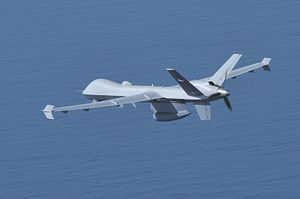Last week, a pair of U.S. senators from both the Republican and Democrat parties have jointly sent two letters (see here and here) to U.S. Defense Secretary Jim Mattis and Secretary of State Rex Tillerson urging the completion of two defense deals between India and the United States.
Senator John Cornyn (R-TX) and Senator Mark Warner (D-VA), co-chairs of the U.S. Senate India Caucus, in one letter, call on the United States to approve a deal to co-produce Lockheed Martin F-16 fighters in India. In a second letter, the two call for the U.S. government to approve the export of the General Atomics Guardian. The Guardian is a nonlethal variant of the MQ-9 Reaper drone, used by U.S. Customs and Border Protection and the U.S. Coast Guard.
The two senators acknowledge the “strategic importance of the growing United States-India defense and economic relationship,” which has enjoyed broad bipartisan support in Washington, D.C., for well over a decade now. They further note that India “increasingly serves as an integral partner in the United States’ security architecture in the volatile South Asia region.” This comment echoes Mattis’ own remarks to India’s national security adviser two weeks ago. Mattis commended India for promoting “stability in the South Asia region” then. In addition to highlighting the strategic value of the deals, Cornyn and Warner highlight the potentially positive effect of the deals on preserving U.S. employment in the defense sector.
With the inauguration of the Trump administration, things have been slow-moving on the U.S.-India defense cooperation move. When Mattis spoke to his former Indian counterpart, Manohar Parrikar, in February, he brought up the Defense Technology and Trade Initiative. His predecessor, Ash Carter, had long spearheaded that project to encourage U.S.-India collaboration on defense commerce and technology. In its final year in office, the Obama administration further recognized India as a “major defense partner,” an effectively bespoke status for New Delhi that signaled the United States’ intent to deal with New Delhi as it would with its closest allies in the region.
Despite Cornyn and Warner’s calls to action, the two deals in question are actually quite far from being actual “deals.” Following the demise of the old Medium Multi-Role Combat Aircraft (MMRCA) tender, which had been awarded to France’s Dassault for its Rafale fighter, and India’s decision to sideline the domestically developed HAL Tejas Light Combat Aircraft, India will open up another 200-jet competitive bidding process for foreign suppliers, looking for a medium-weight aircraft to succeed its fleet of MiG-21 fighters. The F-16 may be a compelling option for New Delhi here, as it had been during the MMRCA process, but under Prime Minister Narendra Modi’s ‘Make in India’ initiative, New Delhi will look to negotiate aggressively for concessions on technology transfer and domestic production.
Meanwhile, the process toward concluding the sale of the Guardian drone is further along in the sense that New Delhi officially filed a letter of request last year to the United States, kicking off the latter’s Foreign Military Sales process. With the change of administrations in the U.S., there has been little publicly reported on the state of this deal. The United States has yet to formally accept the Indian request and was examining the requests’ compatibility under its export rules for unmanned systems and based on existing commitments under the Missile Technology Control Regime, which India joined last year.

































